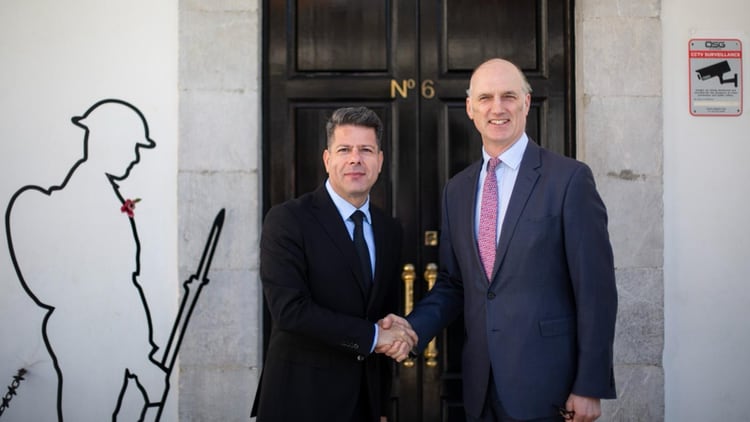Eduardo González
The Secretary General of Amnesty International (AI), Agnès Callamard, presented yesterday to the Minister of Foreign Affairs, José Manuel Albares, the Agenda for the XV Legislature, which includes, in the field of foreign action, the inclusion of human rights in “the political agendas of all bilateral meetings.”
Agnès Callamard and the director of the organization in Spain, Esteban Beltrán, lead a delegation from Amnesty International that has been in Spain since yesterday and until tomorrow, Wednesday, to present the Agenda for the XV Legislature, a document that summarizes AI’s main concerns in human rights matters for the next four years, according to sources from the organization informed The Diplomat.
The delegation was received yesterday by José Manuel Albares (The Diplomat tried to obtain details about this meeting, without result) and the Minister of the Interior, Fernando Grande-Marlaska, and includes in its agenda meetings with the second vice president of the government and Minister of Labor and Social Economy, Yolanda Díaz; the Minister of Social Rights, Consumption, and Agenda 2030, Pablo Bustinduy; and the deputy secretary general of the Popular Party, Esteban González Pons. Once the meetings are over, the delegation will address the media tomorrow to present the conclusions of the visit.
At the more strictly level of foreign action, the agenda proposes “a high political and economic commitment to the multilateral system of human rights”, urges “to end the ‘double standard’ that avoids taking forceful measures against war crimes or against humanity if the person who commits them is a strategic ally” and calls for the reestablishment of the principle of universal jurisdiction in Spain and the protection of the civilian population in conflict situations “through the reception of refugees, humanitarian aid or the suspension of arms sales, among other measures.”
The document warns that, “the best way to reinforce Spain’s candidacy to become a member of the Human Rights Council again in the period 2025-2027” – announced on February 26 before the UN by Albares himself – “is maintain a continued and comprehensive vocation to promote progress in multilateral forums.”
To this end, Amnesty proposes compliance with the State Foreign Service and Action Law of 2014 “in order to include clear and concrete human rights commitments in the annual foreign policy strategy and plans” and urges “active, economically and politically to strengthen the universal human rights system of the United Nations” and to oppose the use of the right of veto by the permanent member states of the Security Council “in cases or imminent risk of genocide, war crimes and crimes against humanity”.
The Agenda also urges Spain to “promote the necessary actions to ensure the protection of the civilian population in the event of conflict, guaranteeing compliance with international human rights law and international humanitarian law,” as well as “unhindered access to the civilian population to humanitarian aid in situations where crimes under international law are committed, such as, for example, in Ukraine, the Occupied Palestinian Territories, Ethiopia and Sudan.”
Israel and Occupied Territories
In the case of Israel and the Occupied Palestinian Territories, Amnesty calls for “addressing the root causes of the conflict, including dismantling the apartheid system imposed by Israel on the entire Palestinian population” and lifting Israel’s “illegal blockade.” on Gaza for 16 years, and to “demand an end to illegitimate attacks, including indiscriminate attacks, direct attacks against people and civilian objects, both by the Israeli army and Palestinian armed groups.” Furthermore, he continues, “Hamas and other armed groups must release all Israeli hostages.”
“Spain must permanently suspend the sale of weapons to Israel, given that they commit serious violations of human rights that constitute crimes under international law,” warns the Agenda. In addition, the Government of Spain and the European Union “must regulate the activities of companies domiciled in their jurisdiction to prohibit them from operating in settlements or trading with them.” Consequently, “the Government of Spain must ask the Basque company CAF and the Catalan company COMSA to abandon their light rail projects in Jerusalem” and “it must ask the company E-Dreams to end its operations linked to the Palestinian Territories Busy,” he adds.
The Agenda also demands the end of the “unprecedented” repression in Russia and respect for international humanitarian law, the protection of the civilian population and the end of aggression in Ukraine and urges UN Member States “to “to unite in condemning the crimes of aggression committed by Russia and to provide aid and assistance to the people of Ukraine, including people fleeing the conflict.”
Bilateral relations
In another chapter of the Agenda, Amnesty demands that the Spanish Government commit to making “human rights a priority negotiation topic in bilateral relations with other countries, with continuity over time and visible results”, a commitment that implies “ incorporate human rights into the political agendas of all bilateral meetings”, promote “full respect for human rights in the agreements and conventions signed with other countries in matters such as development cooperation, immigration control and business investment and take steps to “ support cases of victims and human rights defenders.”
Regarding specific cases, the Agenda urges Spain to “actively” promote before the Moroccan authorities “respect for the exercise of freedom of expression, assembly and peaceful association, especially in relation to Western Sahara”, which “includes repeal laws that criminalize activities related to the peaceful exercise of the right to freedom of expression, allow the registration of independent organizations in the official registry, and put an end to the intimidation of human rights activists and defenders,” and to “ promote that the mandate of the United Nations Mission for the Referendum in Western Sahara (MINURSO) includes a human rights monitoring component.”
Regarding Latin America, the document (which also includes recommendations for China, Iran, Saudi Arabia, Poland, Hungary, the United States, Colombia and Mexico, among other countries) asks Spain to urge Cuba to allow “access to its territory “international human rights organizations, including Amnesty International, and UN rapporteurs, to independently investigate the human rights situation in the country,” as well as to “end harassment, intimidation and persecution.” of human rights activists, journalists and political dissidents who exercise their right to freedom of expression, assembly and association.”
Likewise, it calls for pressure on Venezuela to “ensure that all people, including human rights activists, can exercise their human rights without discrimination, including the rights to freedom of expression, association and peaceful assembly”, as well as to “demand the immediate release of all people arbitrarily detained.” The document also warns against “the Nicaraguan government’s systematic policy of repression to silence dissident voices and any type of criticism” and calls for the international community to continue acting “in an articulate and forceful manner.”







